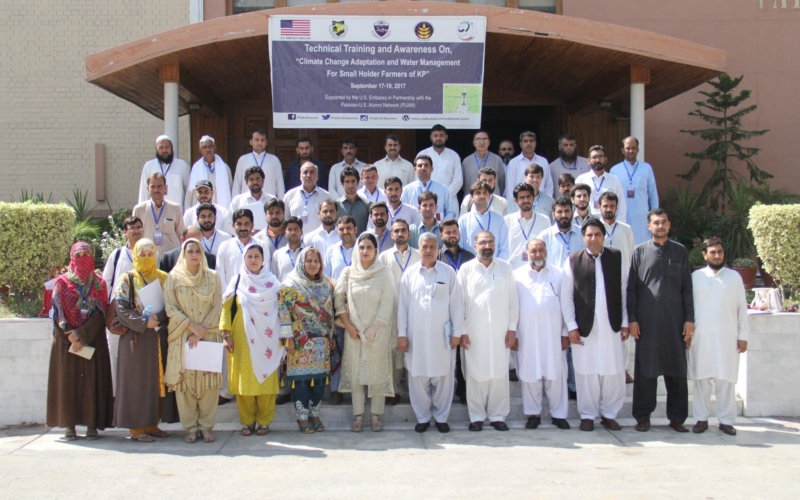Environmental Scientist, Dr. Bushra Khan, has been noticing that climate change and reduction in water availability have started to leave an adverse effect on crop production in agriculturally rich areas of Khyber Pakhtunkhwa (KP) while some effects resulted into crop failure in certain areas. She observed that farmers were unaware of the growing challenges which consequently lead to water shortage and climate change.
Pushed by the scenario, Fulbright alumna Dr. Bushra felt inclined to conduct a training to address and illustrate the impact of the change in climate on food security, environmental sustainability, and water resources. She planned and organized an extensive project called the ‘Climate Change Adaptation and Water Management for Small Holder Farmers of Khyber Pakhtunkhwa (KP)’ with the support of the U.S. Mission in Pakistan through the PUAN Alumni Small Grant.
The project, implemented between July 5, 2017, to September 25, 2017, entails two components: a) awareness and training held at five selected districts of KP and b) technical training conducted at the University of Peshawar. The project aimed at providing comprehensive guidelines and enhancing the capacity of several stakeholders to learn about climate change, and introduce frameworks, tools, and techniques to facilitate better planning. Another objective was the designing of community-based adaptation for water management, farming, and climate change.
A total of 10 awareness sessions were held in five districts of Khyber Pakhtunkhwa including Peshawar, Nowshera, Charsadda, Mardan and Swabi, through which one hundred farmers directly benefited and were able to voice their concerns.
After the completion of the first component, the planning committee selected 50 participants from the aforementioned districts for an extensive technical training that focused on three further aspects: 1) raising awareness on climate change, 2) water conservation, and 3) how farmers can benefit from the scientific research.
The training session included eight lectures, discussions, interactive sessions, and classroom activities. The training intended to support the U.S. and Pakistan Government’s overall objective of “improved skill development and increased use of modern technology and management practices”.
The training upgraded the knowledge and skills of participants in terms of efficient water use for better agricultural productivity. As Muhammad Ali from Peshawar, who is a farmer and a student shared;
“I was not aware of testing the water before irrigation. After attending the training, I have learned how important it is to test the water and how it greatly affects the corps production.”
The participants were informed about several techniques for better agricultural productivity, water management, agricultural sanitation and hygiene, and climate change resilience, adaption and mitigation measures during the workshop.
Following conversations with farmers, it was noted that the change in climate pattern has also resulted in an increase in the cost of crop production, including more use of fertilizers, pesticides, purchase of seeds and higher electricity costs for watering the crops. A researcher officer from Peshawar said, “the coursework enhanced my knowledge about the pests that are affecting the crops in different provinces and what tools can be used to prevent it. As I return to my research facility, I will collect samples of the discussed pests and environment on how we can improve crop yield while depowering these pests.”
Towards the end, the experts briefed the participants about a variety of the locally produced seeds and recommended that they could stand well against the impact of climate change. The organizer, Dr. Bushra talks about the sustainability and expectations of the project at the concluding ceremony;
“I am confident that the farmers will now not only initiate a conversation around the climate change in their communities but will also keep an eye on practices that are incompatible with the climate change, and will consult with research centers and departments of the local government for the construction or management of small water resources. With this training, the farmers now have the platform to contact the research offices and universities if they come across a problem rather than letting the problem grow.”
The entire program proved to be an immensely successful initiative which not only brought together the farmers from the mentioned districts, but also encouraged immersive discussions on issues that mattered for the agricultural development of the region.
This event was made possible with the help of an alumni small grant from the Pakistan-U.S. Alumni Network (PUAN). All alumni of various U.S. government-sponsored exchange programs in Pakistan are eligible to apply for the grant of up to 10,000 USD to enable them to give back to their communities.





